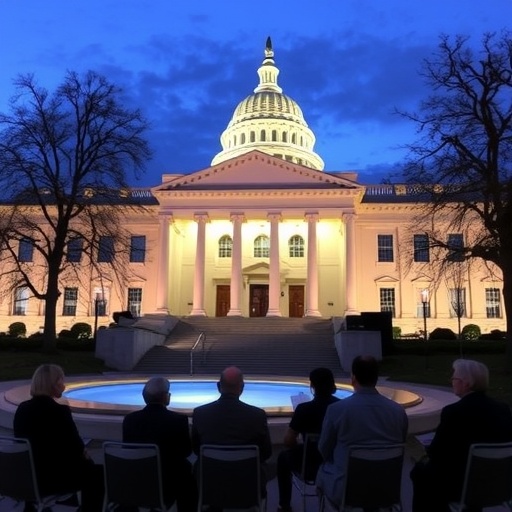The 2025 NFCR Global Summit and Award Ceremonies for Cancer Research & Entrepreneurship, scheduled for October 24, 2025, at the historic National Press Club in Washington, D.C., promises to be a landmark event in the oncology field. This annual gathering assembles an elite group of world-renowned scientists, visionary entrepreneurs, forward-thinking investors, and passionate patient advocates. Together, they aim to challenge conventional paradigms, unveil transformative ideas, and ignite collaborations that will define the future trajectory of cancer research and patient care.
At the core of this summit lies a commitment to bridging the expansive gap between bench research and clinical application. Attendees will benefit from a rich tapestry of discussions that explore the quantum leaps in oncology, with a particular focus on precision medicine and artificial intelligence (AI). These technological advancements are revolutionizing cancer detection, therapy optimization, and disease prognosis. The integration of AI-driven algorithms with genomic data allows unprecedented sensitivity in early cancer detection, predictive modeling, and adaptive treatment regimens tailored to individual patient profiles, fundamentally shifting the oncology landscape.
A highlight of the summit is the keynote led by Dr. Monica Bertagnolli, M.D., freshly appointed President of the National Academy of Sciences and former Director of both the National Institutes of Health and the National Cancer Institute. Dr. Bertagnolli’s leadership embodies a key nexus between governmental research funding, academic investigation, and translational medicine. Her insights into the evolving role of interdisciplinary research and policy in streamlining the path from discovery to therapy implementation promise to catalyze innovative dialogues among attendees.
The event also boasts the presence of eminent cancer research leaders such as Dr. Webster K. Cavenee, a luminary in cancer genetics and tumor biology whose work elucidated the genetic underpinnings of oncogenesis. Dr. Lisa Coussens, an authority on tumor immunology and former President of the American Association for Cancer Research, will contribute her expertise on the tumor microenvironment and immune modulation. Their contributions underscore the critical importance of understanding cancer both as a genetic and immunological disease, fostering the development of multi-modal therapeutic strategies.
Further enriching the program is Dr. Ronald DePinho of the MD Anderson Cancer Center, a pioneer in cancer biology and pharmacological innovation, alongside Dr. Tony Hunter, the recipient of the 2025 Szent-Györgyi Prize for Progress in Cancer Research. Dr. Hunter’s seminal discovery of tyrosine phosphorylation as a regulatory cellular mechanism revolutionized targeted cancer therapies, leading to over fifty FDA-approved drugs that have changed the prognosis for countless patients worldwide.
The summit also places strong emphasis on the emerging role of AI and advanced computational analytics in oncology clinical trials and patient care. Nathan Lear, Head of Advanced Medical Analytics at AstraZeneca, will address the transformative impact of machine learning techniques in designing adaptive clinical trials that dynamically adjust parameters based on real-time patient data. This paradigm enhances trial efficiency, optimizes therapeutic dosing, and accelerates drug approval, heralding a new era in oncology drug development.
One of the featured events is the AIM-HI Oncology Leadership & Entrepreneurship Forum, spearheaded by Patty Obermaier, a former Microsoft Health Tech executive. This forum epitomizes the convergence of science and business, spotlighting startups like ResNovas Therapeutics and Chiara Biosciences that are translating preclinical discoveries into precision oncology therapeutics. The active involvement of visionary investors from organizations such as Eos BioInnovation and PagsGroup provides vital financial support, enabling early-stage companies to surmount translational hurdles.
The summit’s capstone is the prestigious Szent-Györgyi Prize ceremony. Established to honor the memory of Nobel Laureate and NFCR co-founder Albert Szent-Györgyi, the award recognizes groundbreaking contributions with enduring clinical impact. Dr. Hunter’s recognition underscores the profound influence of molecular biology on the development of targeted therapies, which has ushered in an era of precision oncology characterized by specific kinase inhibitors and monoclonal antibodies tailored to tumor molecular profiles.
In addition to honoring past achievements, the NFCR Global Summit actively fosters forward-thinking discussions regarding ongoing challenges in oncology. These dialogues address topics such as cancer metabolomics, resistance mechanisms to targeted therapies, and the integration of multi-omic data to better understand tumor heterogeneity. Emphasis is placed on creating collaborative frameworks that enable sharing of big data across institutions, thereby accelerating discovery and clinical translation.
The National Foundation for Cancer Research, backed by over five million donors over the past five decades, has uniquely positioned itself to fund high-risk, high-impact cancer research projects that might otherwise be overlooked. Its commitment to pioneering science supports the development of next-generation diagnostics and therapeutics, emphasizing innovation over incremental advances. This ethos complements the summit’s mission of bringing disparate stakeholders together to shape oncology’s future collaboratively.
The event will also provide a platform for diverse voices, including cancer survivors and patient advocates, presenting real-world perspectives that underscore the urgency for novel therapies and personalized care. The integration of patient-centric approaches in research design reflects shifting paradigms toward holistic oncology care that values quality of life alongside treatment efficacy.
Finally, the summit’s venue, the National Press Club, sets a historic and symbolic stage for announcing critical oncology breakthroughs. Known as a platform where major scientific and medical developments are publicized, it amplifies the summit’s role in not only disseminating knowledge but also influencing public health policies and funding priorities at a national and global scale.
In sum, the 2025 NFCR Global Summit and Award Ceremonies represent an unparalleled confluence of scientific excellence, entrepreneurial spirit, and patient advocacy that together propel the fight against cancer into new realms of possibility. With its emphasis on cutting-edge technologies, collaborative innovation, and translational impact, this event reiterates the commitment of the global oncology community to delivering meaningful advances that will improve survival and quality of life for patients worldwide.
Subject of Research:
Cancer research advancements, precision medicine, artificial intelligence in oncology, targeted therapies.
Article Title:
2025 NFCR Global Summit: Innovating the Future of Cancer Research and Therapy
News Publication Date:
October 6, 2025
Web References:
– https://www.nfcr.org
– https://www.aim-hiaccelerator.org
Keywords:
Life sciences, Cancer, Cancer risk, Cancer genetics, Cancer metabolomics, Cancer patients, Oncology, Precision medicine, Artificial intelligence, Targeted cancer therapies, Tumor immunology, Cancer entrepreneurship




